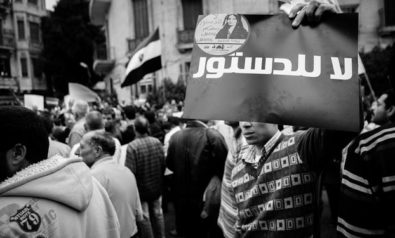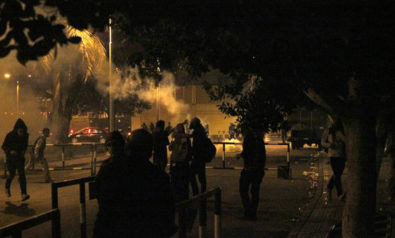Egyptian President Mohammed Morsi’s decree in late November gave himself judicial immunity. The ensuing announcement of a constitutional referendum has divided the country and sent protestors into the streets once again.
Background
Since Mohammed Morsi became Egypt’s first democratically elected president in June 2012, he has aggressively reclaimed power from the military council, which ruled Egypt during the interim between Hosni Mubarak’s fall and Morsi’s election. A relatively unknown member of the Muslim Brotherhood prior to the election, Morsi has surprised critics and supporters alike with his bold political maneuvers, the most recent of which has caused a public backlash.
Entering the election as the Muslim Brotherhood’s backup candidate, Morsi was widely considered the least charismatic among his contenders and did not even participate in the televised debates. If Morsi’s bland image was not enough to doom him to a stagnant presidency, the military council nearly ensured it, limiting the president’s powers and dissolving the Islamist-dominated parliament just before the presidential election.
However, Morsi has defied expectations. Little more than a week after being sworn into office, the Egyptian president reversed the military council’s decision and reinstated the parliament, indicating that that a new one would be elected only after the approval of a new constitution. Just a month later, he fired his intelligence chief and other top security officials. His actions were in response to a deadly militant attack on Egyptian soldiers in the Sinai Peninsula, but they foreshadowed a large military shakeup.
On August 12, 2012, Morsi forced the retirement of Field Marshall Mohammed Tantawi, a Mubarak ally and commander-in-chief of the Egyptian Armed Forces who had led the ruling military council after the revolution and had served as Minister of Defense for more than 20 years. Morsi also ordered the army chief of staff and several senior generals to retire. In a final blow to the military’s power, Morsi nullified the military council’s pre-election constitutional declaration, which had limited the president’s powers, and replaced it with his own, which gave him broad legislative and executive powers.
After securing his authority in his own country, Morsi established himself as a key player in the region when he helped broker a ceasefire between Hamas and Israel in November 2012, ending the fiercest fighting in the Gaza Strip in nearly four years.
On the heels of his success, however, Morsi made a bold move that has been met with unprecedented popular resistance. On November 22, the morning after the Hamas-Israel ceasefire went into effect, Morsi issued constitutional amendments that protected him and the Constituent Assembly from judicial oversight. Morsi claimed that the courts planned to dissolve the assembly before it produced a draft constitution, which would cause further turmoil in an already difficult transition.
Morsi and his advisors maintained that the decree was a temporary measure. However, their assurances did little to appease a public that recognized the significance of Morsi’s decree: no one had the power to revoke his decisions until a constitution was ratified and a new parliament elected.
Why is Morsi’s Decree Relevant?
Morsi’s November 22 decree has caused the worst unrest in Egypt since the revolution and has shown how deeply divided the country remains regarding its future direction. Protests and street battles between Islamists and opposition groups have left eight people dead and hundreds injured.
The public outcry started in response to Morsi’s decree but worsened after November 30, when the Islamist-dominated Constituent Assembly pushed through the approval of a constitution draft without the support of its Christian and liberal members. Morsi announced that a referendum on the constitution would be held in two weeks. Opposition groups insist that Islamists forced the draft, which they fear will extend the reach of shari'a (Islamic law), through the assembly and to a vote too quickly.
On December 8, 2012, Morsi annulled the decree with which he gave himself judicial immunity, but he refused to postpone or cancel the referendum vote, the first round of which was held on December 15. According to unofficial results, the constitution passed by a narrow margin.
Opposition groups continue to protest the constitution draft ahead of the second round of voting, scheduled for December 22. The draft is likely to be ratified in the upcoming round, since the voting will occur in areas considered more sympathetic to Islamists than those in the first round.
Morsi’s decree may have succeeded in accomplishing his objective — moving Egypt towards a new constitution. However, low voter turnout, accusations of voting violations, and the clear division of the Egyptian public in the first round of voting suggest that this constitution is more likely to prolong the country’s political turmoil than it is to bring stability.
For more than 10 years, Fair Observer has been free, fair and independent. No billionaire owns us, no advertisers control us. We are a reader-supported nonprofit. Unlike many other publications, we keep our content free for readers regardless of where they live or whether they can afford to pay. We have no paywalls and no ads.
In the post-truth era of fake news, echo chambers and filter bubbles, we publish a plurality of perspectives from around the world. Anyone can publish with us, but everyone goes through a rigorous editorial process. So, you get fact-checked, well-reasoned content instead of noise.
We publish 2,500+ voices from 90+ countries. We also conduct education and training programs on subjects ranging from digital media and journalism to writing and critical thinking. This doesn’t come cheap. Servers, editors, trainers and web developers cost money.
Please consider supporting us on a regular basis as a recurring donor or a sustaining member.
Support Fair Observer
We rely on your support for our independence, diversity and quality.
Will you support FO’s journalism?
We rely on your support for our independence, diversity and quality.








